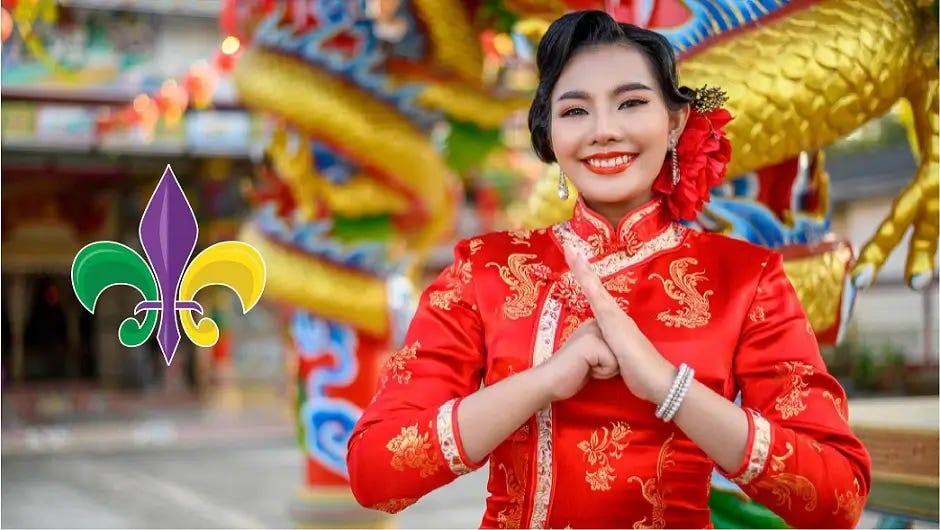After the Vietnam War, thousands of Vietnamese refugees came to the United States looking for safety, stability, and a fresh start. Some landed in California. Others in Texas. But in New Orleans, something extraordinary happened.
They didn’t just come here. They thrived here.
From New Orleans East to the Westbank, through Village de L’Est, the Versailles neighborhood, parts of the Ninth Ward, and even the edges of the Seventh Ward and Gretna, Vietnamese communities became part of the living, breathing fabric of the city.
And they brought gifts with them: faith, food, family, resilience, and culture that continues to shape New Orleans in ways both quiet and delicious.
Why New Orleans?
Let’s be real: it wasn’t the easiest place to start over. But there were powerful reasons why New Orleans became home.
The climate reminded many of Vietnam. It’s humid, lush, and filled with seafood and promise. Catholic Charities helped too. Backed by the Archdiocese of New Orleans, they sponsored Vietnamese families and connected them to churches, schools, and job opportunities.
In the early days, refugees found housing where it was available, often in areas like New Orleans East, the Westbank, and older neighborhoods near the river. Over time, they built tight-knit communities rooted in tradition and faith, but open to the culture around them.
The Heartbeat: New Orleans East
While the Vietnamese presence is spread across the metro area, the spiritual and cultural heartbeat has long pulsed from New Orleans East. That’s where you’ll find Mary Queen of Vietnam Church, a cornerstone of community and connection. Mass is celebrated in Vietnamese. Children learn their grandparents’ language. And during Tet, the Vietnamese Lunar New Year, the entire area transforms into a multi-day celebration of lion dancing, fireworks, prayer, and the kind of food that makes you rethink your entire weekend plans.
The Food That Changed the City
It started with a few humble storefronts. Pho joints. French-Vietnamese bakeries. Tiny groceries with hard-to-pronounce sauces and the freshest herbs you could find.
Now? Vietnamese cuisine is a full-on pillar of New Orleans food culture.
Dong Phuong Bakery in New Orleans East became a sensation, and not just for its heavenly banh mi. Every Carnival season, locals line up for hours to get their hands on their legendary king cakes. It’s Vietnamese. It’s New Orleans. It’s magic.
Across the city, you’ll find family-run restaurants serving bun bo hue, goi cuon, and crawfish seasoned with lemongrass, garlic, and Thai basil. You’ll even see Vietnamese-Creole fusion on menus, proving that flavor knows no borders.
And yes, our chefs have taken notice. The creativity and depth of Vietnamese cooking has influenced kitchens from the French Quarter to the Marigny and beyond.
Resilience Is a Family Recipe
When Katrina hit, it devastated the entire city, but the Vietnamese community came back fast and strong. Many didn’t wait for the city or federal aid. They returned, cleaned up, rebuilt homes and reopened businesses. Churches were among the first buildings to come back to life.
In 2006, the community made headlines when they successfully organized to stop a landfill from being built near their homes. Their protest was rooted in environmental protection, health concerns, and fierce neighborhood pride. They weren’t just rebuilding. They were drawing the line. And they won.
That same spirit carries through today, as younger generations lead efforts in education, environmental activism, urban farming, and cultural preservation.
A Living, Evolving Culture
Vietnamese culture in New Orleans isn’t stuck in the past. It’s constantly evolving. Today’s Vietnamese New Orleanians are chefs, doctors, teachers, musicians, activists, and artists. Many are bilingual. Some aren’t. Some mix crawfish with chili oil and others serve banh xeo at second lines.
But all of them carry the legacy of survival, adaptation, and pride.
Their story isn’t just about resettlement. It’s about transformation. It’s about neighborhoods, palates, identities.
You’ll find that story in the spice aisle of a corner market. In the hum of prayer at a bilingual Mass. In the slurp of noodles on a Saturday afternoon. In a king cake with a flaky crust and a name that sounds like home.
So next time you think about what makes New Orleans special, remember this:
It’s not just jazz and gumbo.
It’s pho and fresh herbs.
It’s Vietnamese coffee in a go-cup and a bakery that sells out by noon.
It’s people who came here with nothing and gave everything.
And the city is richer for it.




